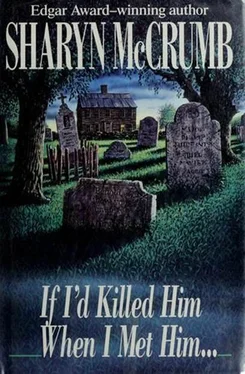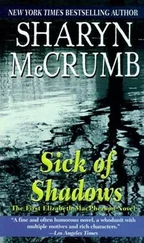She joined Edith for a tour of the rest of the house. The old place had been built at least a century earlier as a simple wooden farmhouse, with two large rooms on either side of the modest entrance hall, where a straight staircase led upstairs to four bedrooms, one of which had been subdivided with wallboard to form an upstairs bath. Each bedroom was resplendent with multicolored deep-pile shag carpeting in iridescent colors, clashing almost audibly with the peeling floral wallpaper from decades past.
“Maybe it was the house,” muttered Edith, after they had contemplated the riot of color in stunned silence.
“Maybe it would have looked better after he’d painted the walls,” said Elizabeth, who was loath to criticize the decorating taste of the recently departed. “Anyhow, I expect he got a good discount on the carpeting, since he was in the business. Let’s look around for anything that seems out of the ordinary.”
Edith pointed to the pink-and-purple heather shag monstrosity that seemed to be exhaling dust motes before them. “That qualifies.”
“I mean, bottles in medicine cabinets, or loose floorboards, or-”
“Secret passages?”
“Oh, sure. Or an empty mummy case, with a sign that says Back in half an hour . Any little thing, Edith.”
The house’s tin roof made the upstairs rooms almost shimmer with heat from the morning sun, but they searched diligently for more than an hour, finding nothing more interesting than a few empty beer bottles tucked in an otherwise empty closet. The bathroom medicine cabinet consisted of two tin shelves behind a paint-spattered mirror. Apart from an accumulation of dirt and two rusty razor blades, it, too, was empty.
Downstairs, they checked the pantry, the parlor, and the dining room, without success. No floorboards were loose. No mantelpieces swung open. No walls concealed hidden rooms. The house was as simple and shabby as it had appeared, offering no clues about the death of the man who had tried to restore it.
Elizabeth and Edith searched the kitchen together, opening every drawer, searching the cupboards, and peering under the sink, much to the mutual horror of Edith and a field mouse in residence. Elizabeth, now on her third glass of tap water, had to keep taking deep breaths to keep from laughing, but Edith was not amused.
It was nearly nine-thirty when Elizabeth, dirt-smudged and shining with sweat, agreed to call it quits. “I know we stayed longer than we intended, and I have to get you back,” she told Edith. “Either the crime-scene investigators found everything, or else there was nothing to find.”
“At least we tried,” said Edith, hurrying to the back door before Elizabeth could change her mind. “Maybe the poison was in the food, after all.”
“Apparently, it wasn’t. But it certainly isn’t here. Maybe someone came to see Chevry Morgan, and brought him something-a poisoned beer, for example.”
“Maybe.” Edith didn’t bother to sound convinced. “Let’s head back to town now. Bill’s due back today from his Florida expedition, and I need to get to the office.”
Elizabeth nodded. “I have some research to do in the UVA medical library.” She looked back at the shabby kitchen with its new linoleum shining in an otherwise depressing hovel of grime. “I keep feeling that I’ve missed something.”
Bill MacPherson had returned from Florida on the red-eye flight, and despite his disheveled appearance and lack of sleep, he had formulated a theory about his new civil-rights case, and he was determined to discuss his legal strategy with his law partner. A. P. Hill received these confidences with grave courtesy, but with a notable lack of enthusiasm.
“Bill,” she said. “Never mind about the mating habits of your mother’s friends. You have a criminal case to worry about. One of your real clients has been charged with the murder of her husband. I had to do the bail hearing for you.”
“Good grief!” said Bill, momentarily distracted. “Poor Donna Jean. I was afraid it might come to that. In domestic cases, the spouse is usually the best bet. Did you get her out?”
“No. I argued that she was harmless, and that she really had no place to run to, but the judge took the view that poisoning people ought to be discouraged, and he set bail at five hundred thousand dollars. So, technically, I suppose she could get out, but of course she can’t afford it. I told her you’d go and see her today.”
“Of course I will,” murmured Bill, running a hand through his already rumpled hair.
“You might want to shave and change clothes first. Otherwise, they might keep you on a charge of vagrancy.”
“Yes, fine, but let me tell you about this other idea I had, Powell. I’ve been thinking about it all the way back on the plane, and I really think I’m onto something.”
“Are you still raving about dolphins?”
Bill nodded eagerly. “You should have seen him, Powell! He could understand everything anybody said to him.”
A. P. Hill wished that she could say the same about Bill, but she merely nodded for him to go on, resigned to the fact that she would have to hear him out before they could proceed with more serious matters.
“The marine-park people were very helpful, and they all said they’d testify as character witnesses. We’ll need character witnesses. It turns out that dolphins often try to initiate sex with their trainers, so you can’t exactly call him an unwilling animal victim. Isn’t that interesting?”
A. P. Hill pictured a local district attorney of her acquaintance prosecuting a dolphin rape case, but she forbore to comment on the matter. “Go on,” she said.
“There’s a precedent for this, you know,” said Bill, pausing dramatically and peering down at her with what he hoped was a look of great shrewdness.
“Oh, no, Bill…”
“Oh, yes, Powell! The Dred Scott decision! Remember? In the 1850s, a runaway slave-”
“He wasn’t a runaway. His master went north to an unorganized territory in which slavery was banned, and he took Dred Scott along with him.”
“Okay. I’ll admit I haven’t read up on it, but I dimly remember hearing about it in class once. Here’s my point: When Scott and his master returned to Missouri, Dred Scott sued for his freedom, claiming that he had been freed by being taken to a free territory. And then you argue all the bits about what constitutes personhood . You know, Dred Scott couldn’t be denied his rights because he was different from what the courts then thought of as a citizen. And I’ll argue that Porky is a thinking, feeling sentient being, whose rights cannot be denied just because he is different. There! Is that a landmark case or what?”
“Aside from the fact that your argument is probably suicidally politically incorrect, because I doubt that Supreme Court Justice Clarence Thomas-to name just one black jurist-is going to enjoy the comparison-aside from that, I do see one glitch in your argument.” A. P. Hill leaned back in her swivel chair and propped her feet up on the desk. The pose usually meant trouble for the other person present.
“Glitch?” said Bill. “What glitch?”
“Dred Scott lost the case. The U.S. Supreme Court, under Chief Justice Taney, ruled that black people were not citizens, and therefore could not sue. Which is exactly what you’re going to hear if you try to pursue this dolphin business. Your finny friend cannot sue for his rights, because he hasn’t got any rights.”
“Okay, Powell. Maybe I haven’t researched this quite well enough yet, and I admit that the Dred Scott case is a setback in my thinking, but don’t forget that blacks were granted citizenship in the- um-thirteenth amendment.”
“Fourteenth. The thirteenth amendment abolished slavery.” She swung her chair round to the bookcase and took down a large, well-worn volume. “Here’s what you are thinking of: ‘All persons born or naturalized in the United States, and subject to the jurisdiction thereof, are citizens of the United States, and of the State wherein they reside. No State shall make or enforce any law which shall abridge the privileges or immunities of citizens of the United States; nor shall any state deprive any person of life, liberty, or property without due process of law, nor deny to any person within its jurisdiction the equal protection of the laws .’” She closed the book and looked up at her partner. “Fourteenth amendment.”
Читать дальше












